Source Evaluation and Search Strategies
General Source Evaluation
This tutorial will help you understand basic concepts related to locating and evaluating information for research projects. By exploring the different types of sources and the criteria and questions for determining the quality of a source, you will be better prepared to conduct a college-level research literature review.
In addition to a topic, the first thing you have to know is the kind of information you are seeking for your research project. Establishing clear objectives for your research process is paramount. For instance, are you interested in "just the facts?" In that case, you may be looking primarily for statistics. Or are you looking for rich descriptions or eyewitness accounts of events or experiences? These objectives will lead you in a different direction from a statistical analysis of your topic.
Read the dialogue from a meeting of freshman virtual students to gain some hints on things to think about before you begin significant searching and source evaluation. These processes, along with a clear goal for your research, will help you filter the sources you uncover more easily, quickly, and efficiently.
Student Dialog - Source Evaluation
Brian: We've been working on things like time management, stress management, listening skills, and note taking skills, but we haven't talked much about how to do research for a paper. Have you had to write a research paper for any of your Penn State classes yet? Or do you have much experience from high school with writing papers?
Deena: That's a good question, Brian. I do have some experience with writing papers in high school, but that was so long ago! Things have changed a lot since then. I think some of the basic skills will still apply, but I don't know anything about how to evaluate information from the Internet, or even how to cite websites. And finding things at the library - that's still a mystery to me.
Brian: Yeah, there are so many resources at the library that sometimes I get so overwhelmed that I just give up! How can I find out what resources are available to use for finding information, and then, how can I learn to use them?
Deena: Have you tried asking the librarian for help? There are also some tutorials on the Web at the library website. Have you tried doing those? Or you could take one of the seminars the library offers to learn about the different resources.
Brian: My first-year seminar instructor did tell us about the tutorials and seminars, but I haven't taken time to do any of them yet. I know I need to do research and that there are a lot of resources available, but how do I know which resources to use and how do I get started?
Deena: First, I think you have to identify your topic. If you don't know what your topic is, you won't know which resources to use.
Brian: I have to write a paper for my freshman seminar about what it's like being a freshman in college and compare my experiences here at Penn State with what it would be like for a student at a small, private college.
Deena: Okay, it sounds like your topic could be summarized as the freshman college experience. You can use your own experiences to write about what it's like to be a student at Penn State. Now that we have a topic, we can develop steps for the research plan.
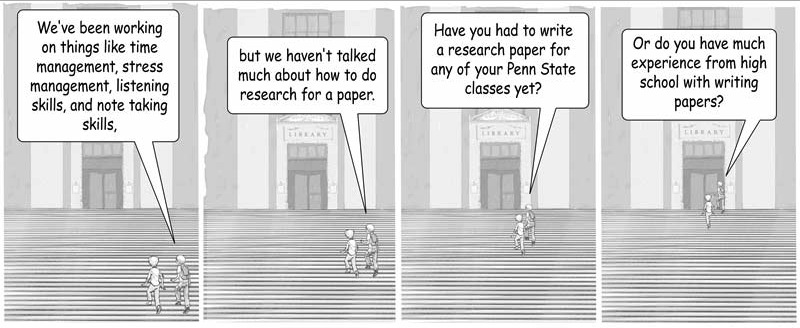
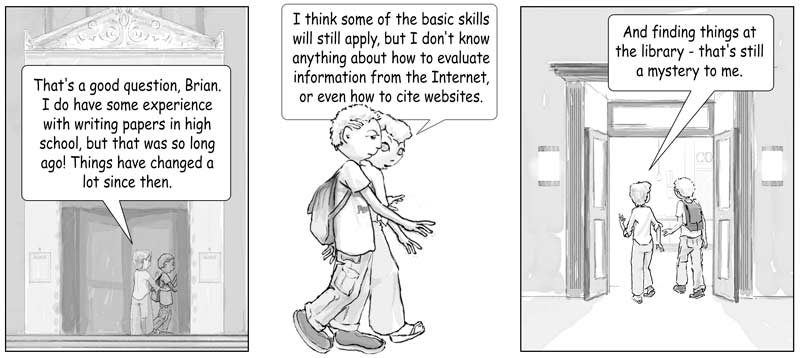
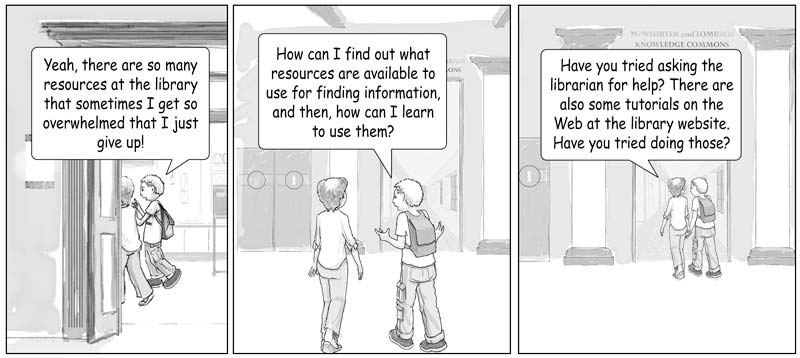
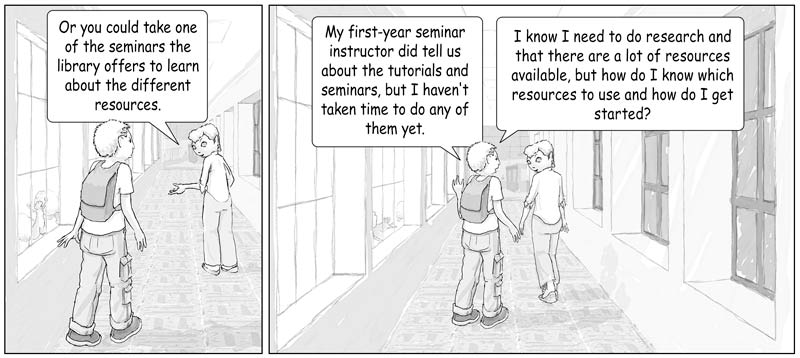
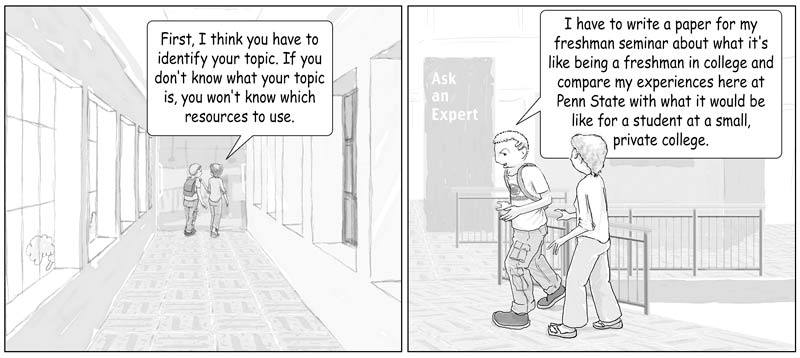
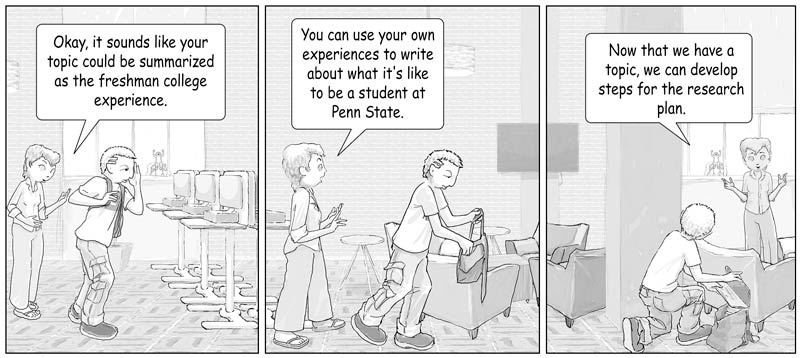
Tip: These tutorials will help you learn to use the online library catalog at Penn State.
https://libraries.psu.edu/guides/howto
Select a Topic
It's a good idea to think about your project before you do significant searching and source evaluation. Having a clear goal for your research will help you filter the sources you find more easily, quickly, and efficiently. Keep these three things in mind as you work on identifying your topic:
- If possible, pick a topic you will enjoy researching - something that will hold your interest.
- Be aware of size and scope. Complex or large subjects require more research time and result in longer papers.
- Keep in mind the length of the final product, difficulty of topic, and target date(s) - don't pick a topic so broad or involved that you won't be able to complete it within the time frame you have been given.
Then, as you think about your topic, ask yourself the following questions.
- Are you interested in just the facts (quantitative date)?
- Are you looking for rich descriptions or eyewitness accounts (qualitative data)?
- How do you think each of these objectives would affect your research?
Tip: To get started on a research project you need to state your topic and identify the types of information you are interested in finding. Try stating your topic in the form of a question or questions to help you focus your research.

Student Dialog - Search Strategies
Brian: So, if the topic is, "the freshman college experience," what kinds of information do I need to find?
Deena: Well, I would like to try to find some magazine articles that talk about sports and other activities at small private colleges. I think that will give me an idea of some of the things that are different about going to a large public university rather than a small private college. I would also be interested in finding blogs or articles written by students.
Brian: Okay. How should we do that? Go to the library and do some research?
Deena: No, I think we need to get some background information on the topic first. Otherwise, we'll just be stumbling around.
Brian: I think I need to know the names of some small private colleges and other information so I can focus my search.
Deena: Yeah. A lot of time would be wasted without first getting some background information. You need enough general information about the topic so you can decide where to focus your research. I think it would help if you wrote down a couple of questions you want to find the answers to before you start to search for information.
Finding Information
Your background search should provide you with a large number and variety of sources. Here are some tips to help you get started:
- Write down what you know about your subject.
- Try some searches in library resources and on the open web to get a sense of the amount of information available on your topic.
- Search in the library catalog (The CAT) for books, search article databases for scholarly journal articles, and look in encyclopedias for basic overviews or background information.
- Remember that bibliographies can often be found at the end of encyclopedia articles, and dictionaries are useful for unfamiliar terms.
- Make an outline to use as a road map. Maps and plans help you to determine if there is too much or too little information available on your topic.
- Check for significant names, dates, and terminology. Think about the "who, what, when, where" of your topic and maybe also the "how" and "why."
Tip: Try out different keywords and phrases as you search. Check your topic words against a thesaurus or subject-heading list to get additional ideas of words to use to search for resources.
The Preliminary Evaluation Process
As you start to research a topic, it is normal to make some more-or-less instant decisions about the value of the resources and materials you find. Here are some primary evaluation questions that you can use to determine whether the resources you found will be valuable to you or not. Much of this information can be obtained from bibliographic information, tables of contents, or citations you have found. Remember, at this point you are only trying to get an overview of the topic.
Currency
- Is the information current, especially if your topic is changing and developing rapidly (check the copyright date, publication date, or, for a website, the date the page was last updated)?
- Is it dated? Has it been updated?
- Is there more than one edition of a publication? Having more than one edition may indicate a standard and reliable source for this topic area.
Relevancy
- Is the information pertinent to your subject?
- What is the tone of the information source (scholarly, popular, or technical)?
Authority
- Are there any credentials listed for the author?
- Has your instructor mentioned this author?
- If a Website, is the content from a reliable source, such as a university or government agency?
- If a journal, has it been reviewed by peers in the discipline?
- If a book, is it scholarly in nature or part of the popular press?
- If a periodical, is it scholarly (i.e., Adult Education Quarterly), of substantive general interest (i.e., The Economist), a popular magazine (i.e., Ebony, Readers' Digest) or sensational (i.e., The National Enquirer) in nature?
Clarity
- Are there any readily apparent biases surrounding the work?
- Are there advertisements or sponsors?
- Is the publisher a university? A scholarly publishing house? The popular press?
Tip: Ask yourself what type of source will be the most useful and most credible for providing information on your particular research topic. With this question as an overarching framework, you will be able to make some preliminary decisions about what materials are scholarly, relevant, and reliable.


